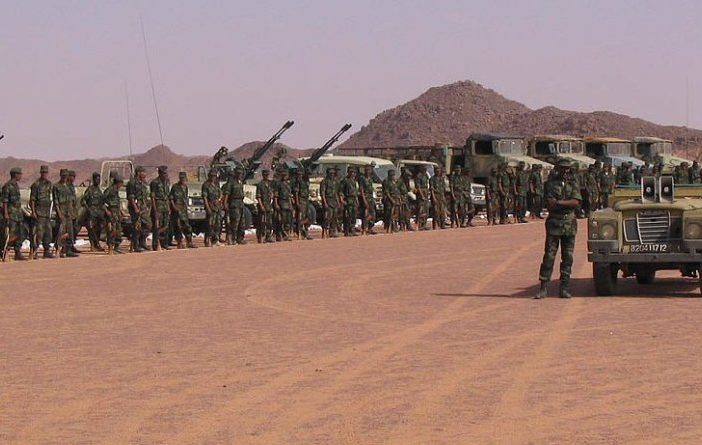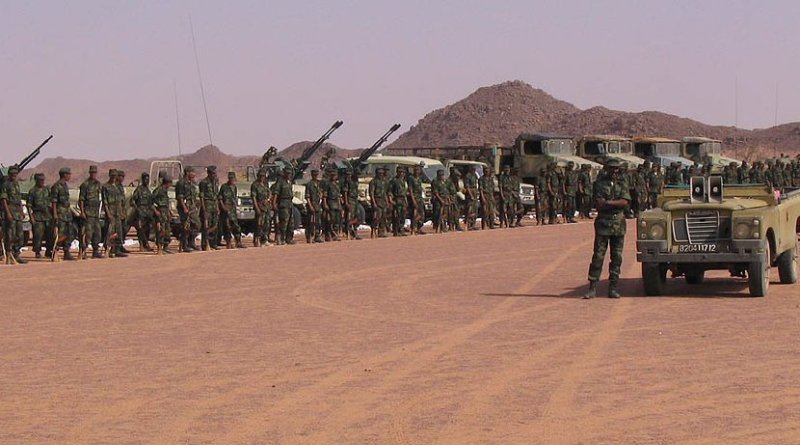Eurasia Review
By Veeramalla Anjaiah
Is Frente Polisario (Polisario Front) losing its supporters from both inside and outside in recent months? The answer is “yes”, especially after its main, longtime backer and financer Algerian president Abdulaziz Bouteflika stepped down from his post in April due to massive demonstrations. It is going to be a very big loss for Polisario in the future.
Another big blow for Polisario came from African countries. In late March, the Southern African Development Community (SADC) organized a solidarity conference for Western Sahara in Pretoria, South Africa. Only five heads of state/government from Namibia, Zimbabwe, South Africa, Lesotho and Uganda as well as representatives from 15 countries attended the conference.
On the same date, on March 25, some 40 African countries (37 countries signed the declaration of the conference) took part in the African Ministerial Conference on the African Union (AU) support to the UN process on the regional dispute over the Moroccan Sahara in Marrakech, Morocco. The conference was a big diplomatic victory for Morocco, which gathered more AU members than heavyweight South Africa.
Morocco explained that the conference was not intended to divide African states but worked for the purpose of African unity.
“Africa’s best interests call on us to come together. It forbids us to fight. Our watchword should resolutely be that of unity, cohesion and coherence,” Moroccan Foreign Minister Nasser Bourita told journalists in Marrakech.
“This conference is an exact illustration of that royal vision in that it aims to unite and move forward. No to division, yes to cohesion, no to rear-guard squabbling and yes to rallying for Africa’s real priority causes,” Bourita said.
The conference in Marrakech sent a clear signal to the world that the majority of countries in Africa no longer support Polisario and its backer Algeria. In 2017, when Morocco was readmitted into the AU, only 10 countries out of 54 opposed its reentry into the regional grouping. Morocco left the regional grouping in 1984 over the issue of SADR’s recognition.
Once, before 2000, Polisario’s Saharawi Arab Democratic Republic (SADR), a country with virtually no land and people, was recognized by 85 countries from across the world. Now many of them either froze or withdrew their recognition of SADR thanks to Morocco’s intensive diplomatic efforts. Countries with leftist governments and some small countries are currently supporting SADR.
On the other hand, Morocco maintains very good relations with most of the major powers in the world, including the US, European Union, China and India.
Under the leadership of President Brahim Gali, both Polisario and SADR lost their shine and became a target of the Sahrawi people. According to latest reports in the international media, many young Polisario members were angry at Polisario leadership for the miserable conditions in refugee camps. The refugee camps were tightly controlled and they were not allowed to leave the camps. The one-party system curtailed people’s rights and led to abuse of power.
Some of the frustrated refugees joined the Islamic State (IS) and Al-Qaeda terrorist groups. There were also reports of people escaping from Polisario’s grip and defecting to Morocco.
Polisario, for its part, criticizes Morocco for suppressing Saharawi people’s rights, including the right to self-determination, in Moroccan Sahara. It also lashed at Morocco for exploiting natural resources, mainly fishing and phosphate resources, in Western Sahara illegally.
The international community is not paying that much attention to end the suffering of 90,000 people for more than four decades. The 600,000 Saharawi people who are living in Moroccan Sahara have a much better life than their peers in Tindouf refugee camps.
Few years back, this author visited the Moroccan Sahara and witnessed massive infrastructure projects like airports, roads, schools, free houses, hospitals, drinking water and public transportation. Moroccan Saharawis are exempted from paying taxes and they have access to soft bank loans, scholarships and jobs.
“Many Saharawi people became lawyers, civil servants, engineers and technicians. Economically, we are better off if we compare with people under Polisario,” Abdul Khali, a resident in Dakhla, told this author.
Polisario, an armed rebel group with leftist leanings, has been fighting for a separate country for the Saharawi people with help from Algeria for the last 44 years. It was founded by El Ouali Mustapha Sayed, a student of Mohammed V University in Rabat, on May 10, 1973. Polisario is fighting against Morocco, which controls more than 75 percent of Western Sahara territory.
Morocco calls the territory “Moroccan Sahara” while Polisario calls it “Western Sahara”, which was a Spanish colony until 1975. Morocco took control of the territory in 1976 when the Spanish left, claiming that the area was a part of Morocco before the Spanish occupied it in 1884. But Polisario claims that Morocco illegally annexed Western Sahara.
Algeria has a grudge with Morocco after a border war called Sand War in 1963 between the two countries. That is the main reason why Algeria encourages Polisario and supports it with money and weapons to wage war against Morocco.
Polisario, which seeks right to self-determination for the Saharawi people, is also the ruling party of the so-called SADR, an African Union (AU) member. SADR’s headquarters are based in Tindouf refugee camps in Algeria.
“Polisario rebels do not control the land. They are based in Tindouf, Algeria”, a senior Moroccan diplomat told this author recently.
It is a fact that the United Nations recognizes Western Sahara as a non-self-governing territory and Polisario controls a tiny portion (20 to 25 percent) of the no-man’s desert. To prevent Polisario rebel attacks, Morocco built a 1,600 km-long sand wall berm on the border between Morocco and Algeria in 1980. Under the supervision of the United Nations, both Morocco and Polisario agreed to a cease-fire in 1991. UN peacekeepers have been monitoring the truce since then.
Both Morocco and Algeria (through Polisario) have been engaging in propaganda war globally for the last three decades. Both have been spending millions of dollars for lobbying in the United States alone.
Polisario claims that it is the sole representative of some 600,000 Saharawi people, who mostly live in the Morocco-controlled Sahara. Though Polisario may claim that between 170,000-195,000 Saharawi refugees live in Tindouf camps, the UN and several international organizations put the figure at 90,000. According to Moroccan media, Polisario always refuses to conduct a census in Tindouf refugee camps and inflates figures in order to get more aid from international organizations. It is alleged that there are also many non-Sahrawis from Mali, Mauritania, Chad and Central Africa in Tindouf refugee camps.
Recently, the UN appointed former German president Horst Kohler as special envoy to find a solution to the long-frozen Western Sahara conflict. Kohler successfully organized two rounds of meetings, which were attended by Morocco, Polisario, Algeria and Mauritania.
Morocco is willing to give greater autonomy to Western Sahara so that Polisario can stop its armed struggle and join the democratic process. But Polisario rejected Morocco’s proposal and sought full independence and a referendum, which are not acceptable to Morocco.
The change of government in Algeria and African countries’ strong determination to end the conflict may bring fresh air to the efforts of the Kohler. It is a welcoming sign that Morocco and the AU fully agreed that any solution to Western Sahara must be under the auspices of the UN and it must be solved through peaceful negotiations. But the resolution of the conflict will depend mainly upon the stance of the Algerian military, a staunch supporter of Polisario. If the Algerian military changes its mind, the Saharawi people can live in peace and both Morocco and Algeria can become good friends like in the olden days.








